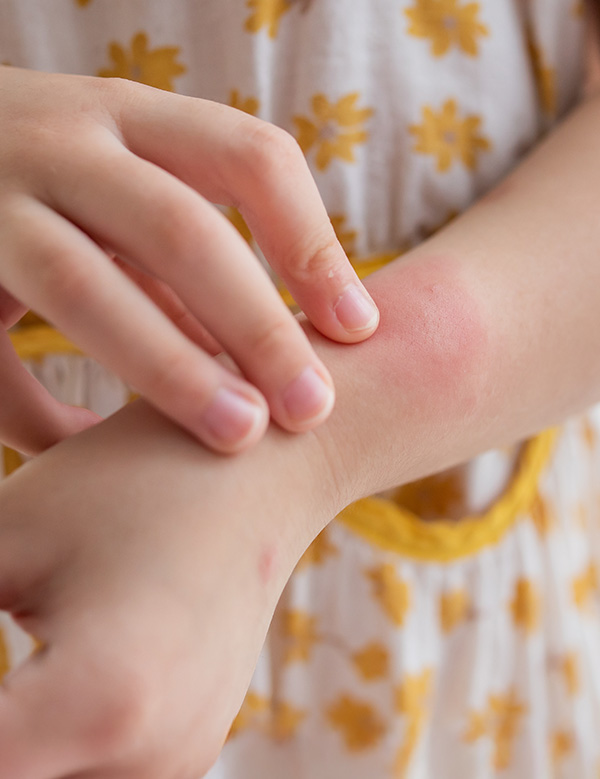Contact Allergies
Recognize and clarify contact allergies in children and adults – with an experienced dermatologist at Derma Medical Clinic in Zurich - Sihlcity
Contact Allergies
Chronische Abszesse und schmerzhafte Knoten durch erfahrenen Hautarzt abklären und behandeln in der Derma Medical Clinic in Zürich - Sihlcity
Itchy rashes, redness or blisters after contact with certain substances: if we suspect a contact allergy, we test for triggers such as nickel, fragrances or preservatives using a so-called patch test (epicutaneous test) – right here at our clinic
Tests
Patch test (epicutaneous test)
Process
Patches applied to the back
Readings after 48 and 72 hours
Duration
three appointments over four days
What Is a Contact Allergy?
A contact allergy – medically known as allergic contact dermatitis – is a delayed skin reaction to certain substances that touch the skin. The immune system overreacts, but not immediately: symptoms usually appear hours or even days after contact.
Common triggers include nickel in jewelry, fragrances in cosmetics, preservatives, dyes, or cleaning products.
Early signs can be vague, like redness or itching. If contact continues, inflamed skin changes may develop – dry, weepy, or very itchy areas.
This test is especially helpful if you …
- notice repeated skin rashes, itching or eczema on your hands, face, neck or chest area
- think your skin reacts to certain cosmetics, care products, cleaning agents or metals
- have ongoing skin problems that keep coming back despite treatment
- are looking for the cause of a stubborn or treatment-resistant eczema
- are unsure whether certain products are suitable for you or your child

What Is a Contact Allergy?
A contact allergy – medically known as allergic contact dermatitis – is a delayed skin reaction to certain substances that touch the skin. The immune system overreacts, but not immediately: symptoms usually appear hours or even days after contact.
Common triggers include nickel in jewelry, fragrances in cosmetics, preservatives, dyes, or cleaning products.
Early signs can be vague, like redness or itching. If contact continues, inflamed skin changes may develop – dry, weepy, or very itchy areas.
Who Should Get Tested for a Contact Allergy?
This test is especially helpful if you …
- notice repeated skin rashes, itching or eczema on your hands, face, neck or chest area
- think your skin reacts to certain cosmetics, care products, cleaning agents or metals
- have ongoing skin problems that keep coming back despite treatment
- are looking for the cause of a stubborn or treatment-resistant eczema
- are unsure whether certain products are suitable for you or your child
Treatment
If a contact allergy is suspected, we do a so-called epicutaneous test (patch test). We place small patches with common allergy triggers on your back and leave them there for 48 hours. Then we check if your skin reacts – for example with redness, itching or small blisters. A second reading takes place on the third day.
The test is painless, well-tolerated and also suitable for children.
What if the results show an allergy?
If we find that you’re allergic to certain substances, we will talk to you about how to avoid those triggers in everyday life. You’ll get clear advice about suitable products, ingredients, and alternative materials.
If you have severe skin reactions, we may also suggest soothing or anti-inflammatory treatments – to help calm your skin and prevent flare-ups in the future.
Initial Consultation
We take time to understand your concerns – or those of your child – in detail. We also include previous reactions and known allergies in our assessment.
Allergy Test
We apply test patches containing common contact allergens, such as fragrances, metals, or preservatives, to your back. The patches stay on for 48 hours.
First Reading (after 48 hours)
After two days, we remove the patches and check if your skin reacted to any substances – for example, with redness or itching.
Second Reading (after 72 hours)
On the third day, we do a second check. Some reactions take longer to appear, especially with delayed allergies.
Results & Recommendations
We go over the results with you, including advice on how to avoid allergens – for example in cosmetics, jewelry, or cleaning products.

At Derma Medical Clinic, allergy diagnosis and treatment is managed by Dr. Markus Dendorfer, a specialist in dermatology and certified allergist.
He has many years of experience in the diagnosis and treatment of allergic conditions – from hay fever to complex allergy-related skin problems.

Dr. med. Markus Dendorfer
Board-certified Specialist in Dermatology & Venereology FMH
What to Expect From Us
Identify allergies
Contact allergies can be tricky – reactions often show up days later. We combine skin expertise with targeted testing.
Child-friendly testing & support
We take a gentle, age-appropriate approach with children and guide families with empathy and clarity through each step.
Practical everyday guidance
We help you identify triggers and give simple, practical advice for safely using cosmetics, personal care items, or materials.
Everything under one roof
You receive diagnostics, medical treatment and cosmetic care all in one place. That means consistent contacts, short paths, and personalized care from first appointment to follow-up.
Do you notice rashes and itchiness from certain materials but don’t know what’s causing it?
Book an appointment now for testing at Derma Medical Clinic in Zurich - Sihlcity.
FAQ – Frequently Asked Questions About Contact Allergy
What is a contact allergy?
A contact allergy – also called allergic contact dermatitis – is a skin reaction to certain substances that directly touch the skin. Typical triggers include nickel, fragrances, preservatives, or cleaning products. Symptoms usually appear 1–3 days after contact, not right away.
What symptoms does a contact allergy cause?
Typical symptoms include:
- Itching and redness at the contact site
- Scaly, weepy, or blistering skin areas
- Burning or tight feeling
- Chronic inflammation with repeated exposure
How is a contact allergy diagnosed?
The gold standard is the epicutaneous test (patch test). Test patches with different substances are applied to the back. After 48 and 72 hours, we check if skin reactions have occurred.
How long does a patch test take?
The application only takes a few minutes – but the results are read in two steps:
- First check after 48 hours
- Second check after 72 hours
This means that full testing usually takes place over three appointments within 3 days.
What if the test is positive?
If your skin reacts to certain substances, you’ll get clear advice on how to avoid them in everyday life. If needed, anti-inflammatory creams or supportive treatments can ease your symptoms.
Is the patch test painful?
No, the test is painless. There are no needles or cuts. If a reaction occurs, you might feel slight itching or tightness at the test site.
Can a contact allergy be cured?
Contact allergies usually last a lifetime but can be well managed by avoiding the trigger. Once you stop contact with the allergen, your skin typically heals fully.
Can I still use cosmetics if I have a contact allergy?
Yes, as long as you know what ingredients cause your reactions. We’ll help you identify trigger substances and explain what to look for in cosmetics, personal care products or jewelry.




